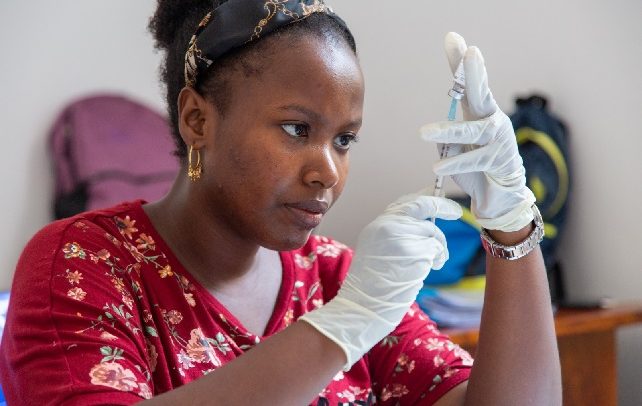Vaccinations at Tanzania Clinical Site Credit: Tom Wilkinson University of Oxford
The Ghana Food and Drugs Authority (FDA) has granted full national licensure for the R21/Matrix-MTM malaria vaccine, developed by the University of Oxford.
The clearance of R21/Matrix-MTM, manufactured leveraging an adjuvant technology from Novavax, and scaled up by the Serum Institute of India Pvt Ltd (SIIPL); the manufacturing and commercialisation license holder for the vaccine, is the first in any country.
With the approval of the vaccine, children aged five to 36 months; the age group at highest risk of death from malaria, can receive the vaccine.
A news release by Oxford University expressed the hope that the vaccine would help Ghanaian and African children to effectively combat malaria.
“The R21/Matrix-M vaccine has demonstrated high levels of efficacy and safety in Phase II trials, including amongst children who received a booster dose of R21/Matrix-M at one year following a primary three-dose regime,” Prof. Adrian Hill, Chief investigator, R21/Matrix-M programme, and Director of the University of Oxford’s Jenner Institute at the Nuffield Department of Medicine.
‘This marks a culmination of 30 years of malaria vaccine research at Oxford with the design and provision of a high efficacy vaccine that can be supplied at adequate scale to the countries who need it most. As with the Oxford-AstraZeneca COVID- 19 vaccine, our partnership with the Serum Institute of India has been key to successful very large- scale manufacturing and rapid development,” he said.
R21/Matrix-M
The R21/Matrix-M malaria vaccine is a low-dose vaccine that can be manufactured at mass scale and modest cost, enabling as many as hundreds of millions of doses to be supplied to African countries which are suffering a significant malaria burden.
The R21/Matrix-M vaccine was initially designed and developed at the University of Oxford and has undergone clinical trials in the UK, Thailand, and several African countries, including an ongoing phase III trial in Burkina Faso, Kenya, Mali and Tanzania that has enrolled 4,800 children with results from these trials expected to be reported later this year.
The vaccine contains Novavax’s (Nasdaq: NVAX) Matrix-M, a saponin-based adjuvant that enhances the immune system response, making it more potent and more durable.
The Matrix-M adjuvant stimulates the entry of antigen-presenting cells at the injection site and enhances antigen presentation in local lymph nodes.
This technology has also been used successfully in Novavax’s COVID-19 vaccine and is a key component of other development-stage vaccines.
Notably, SIIPL has provided vaccine and sponsored Phase III licensure clinical trials, demonstrating its commitment to combatting malaria.
The Serum Institute is also holding ongoing discussions with DEK Vaccines Limited in Ghana to enable future manufacturing in Africa.
Clinical Trials
The release said Oxford researchers and their partners last year reported from a Phase IIb trial that a booster dose of R21/Matrix-M at one year following a primary three-dose regime maintained high efficacy against malaria, and continued to meet the World Health Organization’s Malaria Vaccine Technology Roadmap goal of a vaccine with at least 75 per cent efficacy.
This followed 2021 results from the Phase-IIb trial reporting that R21/Matrix-M demonstrated high-level efficacy of 77 per cent. Recent data from the large phase III trial also show high levels of efficacy and a reassuring safety profile.
This breakthrough is a critical step towards reducing over half a million malaria-related deaths annually and improving the health outcomes of millions of people in Africa and beyond,” said Adar Poonawalla, CEO of the SIIPL.
“The licensure of the R21/Matrix-M Malaria Vaccine for use in Ghana is a significant milestone in our efforts to combat malaria around the world. We remain steadfast in our commitment to scaling up production of the vaccine to meet the needs of countries with high malaria burden and to support global efforts towards saving lives,” she added.
President and Chief Executive Officer, Novavax John C. Jacobs added, “We’re thrilled that Novavax’s Matrix-MTM adjuvant has contributed to the success of this promising and much-needed malaria vaccine. It is our intension to unlock the potential of our adjuvant, both in the near term and over time, to continue to improve public health.”
Managing Director / CEO of DEK Vaccines Limited Dr. Kofi Nsiah-Poku, said, “We are focused on supporting the Serum Institute of India for their vaccines to be manufactured at DEK upon completion of the DEK Factory. Furthermore, the DEK regulatory team will stand by the Serum Institute to get the R21/Matrix-M malaria vaccine registered in other African countries and make it available to African children.”
RTS,S Malaria Vaccine Trials
The World Health Organisation (WHO) 2019 launched the world’s first malaria vaccine in a landmark pilot programme in which Ghana was among the three African countries selected to participate in the trials.
By Jamila Akweley Okertchiri

